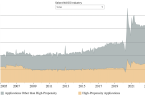The second of the three annual ICANN meetings is in Sydney, Australia in late June. The two main topics for discussion will certainly be around how ICANN is opening the door on applications to gTLD (generic top level domains) to be created next year, the release of idnTLDs is also on the slate.
The new gTLDs is a huge issue as the landscape of the internet will look really bizarre if this takes off as ICANN hopes it will. ICANN feels it’s the right time to let any company, group or individual with enough money and support system in place to open it’s own generic top level domain (gTLD). It will allow generic top level domain applicants to apply (including a very hefty application fee) for any “generic” top level domain they can think of.
In my eyes, opening the domain name system in this fashion is a hasty decision. It looks like a huge money grab that will have negative effects on general internet usability. The domain name system may see gTLDs such as .nike, .coke, .ebay, .google.. Ok, those may be useful and easy to assign. But what about .flowers, .realestate, .cars, .pizza?? Who gets rights to those..? First come, first served? According to ICANN, they approve them on a case by case basis. Now think about these: .mexico, .london, .isreal, .chicago….? ICANN has stated geo gTLDs would be allowed and that local officials will be partially responsible for helping ICANN figure out who can own these gTLDs. How can all of these different types of TLDs be put under the gTLD umbrella? and furthermore doesn’t allowing a geo gTLDs such as .london or .mexico undermine the ccTLD (country code TLD) system we already have in place? Mass confusion may result.
Here is a quote from an ICANN blogger Kieren McCarthy from the post titled “So where are we up to with these new Internet extensions?” on the official ICANN blog.
The “new gTLD program” envisions a very significant increase in the number of “generic top-level domains” – or Internet extensions like dot-com, dot-net, dot-info etc. At the moment there are 21 of these extensions of three characters or more. But the gTLD program is estimating a further 500 within the next two years or so. It’s a huge change in the Internet’s domain name system.
Ok, 500 new gTLDs within two years, sound reasonable right?? Umm, not to me. No it does not sound reasonable. I have watched 18-20 new gTLDs be rolled out over the last 5-8 years, most of which are barely used at all by respective industries. For instance .jobs – When was the last time you or someone you knew went to a .jobs site to search for a job? Or .travel? Yes, I use .travel all the time for my airline bookings! (NOT!) Both of these gTLDs have been around for years now with virtually no real world usages.
What makes ICANN think that popping 500 new gTLDs out of the woodwork will do anything for consumers and internet users?? Why must they rush to open the door to unlimited gTLDs? Seems like they are shooting for quite a high number of gTLDs to add to the domain registry in such a short time. I am predicting massive failure due to hasty decision making by ICANN in these ram and cram, three times a year meetings where new policies are “agreed upon” and implemented.
While reading the ICANN blog on this topic be sure to note in the comment section the specific questions posed by M. Menius and the empty answers Kieren replies with.




I’m not sure I’d characterise my responses as “empty” – more “accurate”.
Anyway, there is an important point that needs to be made here: it isn’t ICANN that is deciding 500 new Internet extensions are needed.
People have to apply themselves for a gTLD. So if they think that they have a compelling enough Internet extension that means they will recoup the costs that running a piece of the DNS entails (much more than the application fee, I can assure you), then they can apply.
What ICANN does is put in safety barriers – make sure that they have enough money to run a top-level domain; make sure they have sufficient technical expertise; make sure that they don’t make money from riding on the back of someone else’s business and so on.
What happened in 2000 and 2003 when the previous extensions were added to the Internet is that ICANN actually did decide which extensions should exist and which shouldn’t and who should run them.
If those extensions haven’t been successful (and you have to ask: in comparison to what? Dot-com? – that was never very likely at this stage in the Internet’s evolution) – but if those extensions are taken to have not been successful then ICANN is in part to blame because it was in the position of deciding – a position it didn’t like and doesn’t want.
What ICANN is trying to do is fulfill its mandate and allow for competition on the Internet. And it is doing that by allowing the market to create new Internet extensions, with ICANN simply ensuring that the rules are followed.
My personal view is that in five years we will all look at this period of worrying about new extensions with appalled amusement – wondering how we ever lived without them.
Kieren
(ICANN’s general manager of public participation)
Kieren – Thanks for your response here.
I understand that ICANN is putting in place safety barrier that ensures only capable entities will be able to create a gTLD. That certainly lays an important foundation for the success of a new gTLD, but that is not my main concern. My worries are with the average consumer and internet user who barely even know what a TLD is beyond .com, .net and .org. Can you truly argue that adding four to five hundred more gTLDs over the next two years will not create confusion? Also, you really believe that in just 5 years we will be looking at a wide open and successful gTLD internet (by this time there would be certainly be thousands of gTLDs, since five hundred are expected in the first two years). Wow, in your opinion then in 5 years .com tld will be just as common (or even obsolete) as any other gTLD?
I don’t quite understand the argument that ICANN doesn’t want the responsibility anymore of deciding what TLDs are appropriate and who should run them. Isn’t this an inherent responsibility of the Interet Corporation For Assigned Names and Numbers? I am also trying to understand the failure of the other gTLDs released by ICANN in 2000 and 2003 as you mentioned. Are you saying they failed partly because ICANN didn’t even really have interest and resented the fact they had to decide which ones to release and also coordinate who ran these extensions?
Thank you Kieren for helping us understand more on how ICANN is moving forward with gTLDs. I appreciate your willingness to discuss and answer questions on these issues.
Hi Mike,
Well, I would firstly question whether the gTLDs released in 2000 and 2003 are a “failure”.
What is success in this space? Is it number of domains? If so, .info and .biz are doing very well with two million and five million each.
The second round of gTLDs were specifically sponsored TLDs – or sTLDs. Their aim was to represent a certain community. And many of them are very happy with what they have.
This is the Internet and so it is a vast global mirror to society. And society comprises mostly of small groups, with very few large groups.
What the gTLD expansion that ICANN is making possible will do is enable the Internet to more accurately reflect its global use by allowing new areas of the domain name system to be created according to the demand for it.
Why doesn’t ICANN want to be in charge of deciding how the Internet evolves in terms of deciding on precise Internet extensions? Because to try to control how the Internet evolves is, in the worst case, to damage its evolution, and in the best case, to try to hold back the tide.
My personal view is that our kids are going to laugh at us in 10 years time when we keep trying to add “.com” to Internet addresses. Then we will bore them to death about how the Internet used to be.
Yes, our early Internet generation will be confused. And then we’ll learn to deal with it – just as we have learnt to deal with cell phones and remote controls and computers and online banking and a change in the road system where we live and every other inevitable small change in our lives.
But note that being confused won’t mean that the Internet that we know now goes away – it will just become a smaller part of a bigger Internet.
In the meantime, a world of new possibilities will open up in the same way that cell phones and computers and the Internet itself have make our lives immeasurably better.
That’s how I see it anyway.
Kieren
Just realized I got dot-info and dot-biz figures wrong – five million dot-info domains; two million dot-biz. I think there are just under one million dot-mobi domains, something like 300,000 dot-name domains, and around 250,000 dot-asia domains.
Sure, dot-com is still the big beast but then my favourite restaurant isn’t TGI Fridays.
Kieren
I’m curious as to how this “confusion” about new TLDs manifests itself.
“Hmm, looks like this domain has an extension other than .com.”
~CONFUSION ENSUES, HEADS EXPLODE, RIOTING IN THE STREETS~
I mean Jesus H. Christ, it’s not brain surgery. BTW, +1 for the TGI Fridays analogy.
@Kieren McCarthy – Kieren, you write …
“What ICANN is trying to do is fulfill its mandate … by allowing the market to create new Internet extensions”
You seem to be skirting around the core issue. ICANN are THE BODY who decide which extensions come into existence, or not. And as the internet evolves, ICANN decide on the next DNS-related steps based on thorough assessment of many competing variables.
I’m a bit put off by this sort of passive disowning you’re crafting here. Who’s writing policy, Kieren, and making key decisions …if not ICANN?
You don’t “allow the market” to do what it wants. That’s why we have government regulation, oversight committees, and paid professionals to critically evaluate the viability of proposals & their risks to the economy, etc.
@Mike – Great looking blog, Mike. Very glad you’ve joined in on this issue.
Best Regards, Max
@ M Menius: There’s no passive disowning – nor would I be in a position to passively disown the work of thousands of individuals from across the world and across society.
ICANN sets the rules by which applications for new gTLDs are judged. Those rules appear in an Applicant Guidebook. That guidebook is going through an extensive period of public comment in an effort to find consensus among the Internet community.
You talk of the market as if markets exist in vacuums. Every market that has ever existed has worked within a complex structure of rules. The fewer the rules, the more open that market.
But that is not always a good thing – look at the current economic crisis, caused by a failure to apply appropriate rules.
At the same time, giving a clear sets of rules and then ensuring that those rules will be followed to the extent that if they are followed, there is no way to stop something from going ahead – well then that is a market. Business adjusts accordingly – as it does every day in every market.
I just don’t understand this determination to find fault with ICANN no matter what it does.
Kieren McCarthy
General manager of public participation, ICANN
Trying to figure out what’s going on in gTLD world today I used google news feature to find a couple articles on gTLDs. The articles had quite contrasting views on who actually wants gTLD’s and who are in favor of them.
First, I found on the press release news wire “Pool.com, Quintaris Confirm Market for Domain Names in New gTLDs Pre-Orders hit 10,000 Per Day in First Month; Firm ICANN Timeline Spurs Demand” here:
http://www.prweb.com/releases/2009/05/prweb2449194.htm
Then I saw the story “ICANN announces further delay to limitless domain plan” here:
http://www.out-law.com/page-10032
After reading the press release it seemed pretty clear to me that pool and quintaris scripted it so that pumps up the outlook and demand for gTLD’s. 10,000 pre-orders per day? ICANN Firm on the gTLD timeline?? The article on out-law.com portrayed a different story. Annoyed brand owners, more ICANN delays, people looking at this like like it’s a huge (and I hate to use this term again) MONEY GRAB by domain registries, registrars, etc.
Well that’s what I got out of the gTLD news today, more confusion..
When ICANN was formed, the network architecture was very different. Users obtained DNS resolutions from an ISP’s server located in a colo or central-office-like facility.
Now, many people obtain DNS resolutions from their Linux-based WIFI routers, with DNSMASQ running. That was part of the NAT evolution. That removes control from a central network choke point and places it in the user’s hands.
It is ironic that many ICANN groupies advocate no central choke points, network neutrality, etc., yet also eschew giving user’s DNS controls.
With a modified version of DNSMASQ, a user can now drop a
new resolver in with a simple update. That new resolver can be much more intelligent than the old ISP-based technology that was in use when ICANN was started.
Times have changed. Technology has moved forward. Consumers are much more educated. Via the DLD approach, the TLDs can be automatically selected. The number of cached DLDs is being expanded from 2,048 to 4,096.
You can see below what was voted to the top back in 1999.
http://www.icann.org/en/comments-mail/icann-current/msg00342.html
10514 INC
9264 ONLINE
7288 NET
6472 USA
4481 GROUP
4101 WEB
3891 TECH
3077 UK
2762 DESIGN
2570 SYSTEMS
2542 IT
2415 US
2378 SOLUTIONS
2322 LINE
2209 LAW
2171 CONSULTING
2161 INFO
2033 SERVICES
2027 WORLD
1966 SOFTWARE
1940 INTERNATIONAL
1932 INTL
1880 CORP
1874 CO
1803 SHOP
1795 FRANCE
1720 HOMES
1671 S
1638 ART
1603 TV
1587 TRAVEL
1555 MAIL
1534 EUROPE
1529 DIRECT
1491 MEDIA
1487 MALL
1431 E
1419 LTD
1417 ASSOCIATES
1411 1
1361 SERVICE
1342 2000
Hows the domain market doing right now? is it the right time for some new gTLDs? I think we currently are looking only for the .coms and i guess next comes the .nets and nothing other than that has value now.
Found a NY Times article on new TLDs thought I should share: http://bits.blogs.nytimes.com/2009/07/13/do-we-need-more-top-level-domains/
[…] […]
[…] first ever blog post on NameTalent.com was about the new gTLD’s, I stated my objections and worries about the […]